.
.
photo by William Gottlieb/Library of Congress
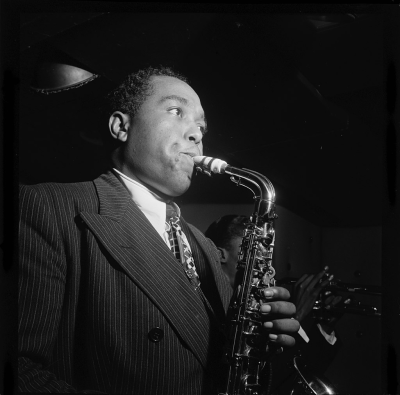
Charlie Parker, 1947
.
___
.
A Letter to Charlie Parker
Dear Charlie,
Your presence never left us in Tom’s Town
Back then it was a good-time town and this place
Shaped you, the glamour and freedom of jazz beckoning,
The intellect and passion flowing through hot breath, busy hands
Today we drive by some of your former hangouts
Lincoln High School, with its nod to Art Deco
The Cherry Blossom Club, the building a victim of arson in the 80s
Its vacant facade still remains, the ghosts of jazz legends drifting about
We see the old Antlers Club in the West Bottoms
where you played with Buster Smith
Wide-eyed and wondering at the afterhours freak show upstairs
And when you first jammed at the Reno Club they laughed you offstage
But you held on furiously to your sax, a quiet loner possessed by the music
Practicing for hours and hours, driving neighbors insane
Hanging out behind the clubs listening, studying those cats
Nothing else mattered
And when you showed up again on that stage, jaws dropped
You hoboed your way to Chicago,
Then New York City in your raggedy, smelly old clothes
They were turned off by your aggressive tone
Told you to play soft and pretty
A mad scientist experimenting, formulating curated chaos
They were afraid, threatened, didn’t know what it was you were trying to do
Even you didn’t know, you just needed to get that savage sound out of your system
Chugging at full speed, leaving swing behind
Hot notes bubbling like magma from that horn
You didn’t stay in this world for long but
Oh how we admire your daredevil ways and tenacity
So in closing, we send our love and reverence
Yours Always,
Kansas City
.
by Lauren Loya
.
___
.
& Bird
Sipping wine at the Deer Head Inn,
while the Phil Woods quartet bebops
through a second set, Ornithology
rocketing past the red stage lights.
Piano, sax, bass & drums
solo between sporadic applause,
club regulars chirping around
a dozen or so tables in the dark,
perched on the rims of their cocktails,
like those other famous lovers of song—
the pileated, chickadee,
junco, titmouse—wetting their beaks,
while nervous notes soar
high above them in the raftered shadows.
This way & that, the birdless & Bird
cock their heads to listen.
.
by Michael Steffen
.
___
.
False Notes
Stand by, Take 4. From the sound engineer
at a Charlie Parker studio recording session.
Hold it! Hold it! You started off wrong!
Charlie chides a sideman, the take spoiled.
Bird’s irritation I get. The sideman’s gaffe too.
How many times have I begun on the wrong note.
With job assignments… finances . . . people.
,
by Peter Gregg Slater
.
___
.
The Fourth Measure
Measure of what? Music, time, size, weight, intelligence, or something else?
How about the birth and evolution of jazz, all those albums stacked up on your shelf?
More often than not, three measures come to mind.
Always New Orleans, New York, and Chicago, for jazz and for rhyme.
But looking closer, there’s a fourth you can find.
It was the beginning of the Oregon Trail, the early roots of swing,bebop, and ragtime.
It was the proving grounds at the edge of the plains,
and for the great ones who made it, they would never be the same.
There was William “Count” Basie, Duke Ellington, Cab and Blanche Calloway,
new names to the industry, with a lucrative future, back in those days.
Of course, this was Kansas City, as yet not even paved.
The musicians and customers came from near and far,
and packed the huge dance halls, to hear these future stars,
playing with the big bands, they danced ’til the morning light.
With few laws, the whiskey flowed, the hookers hooked, the gamblers gambled,
there was no doing wrong, it just all seemed so right.
The White House Tavern, with Walter Page and his Blue Devils band,
Benny Moten’s orchestra at Fairyland Park, dressed in tuxedos, looking so grand,
Paul Tremain’s Aristocrats of Rhythm, at the PlayMor Ballroom,
The El Terreon Ballroom, with Count Basie and Lester Young,
Coon-Sanders and his Night Hawks orchestra, just so much fun.
Kansas City flourished for black owned commerce, centered near 18th and Vine,
Recording studios and music stores, like no other city anywhere at that time.
With all of this organized by the Black Musicians Union, Local 627,
One could say they had found their little corner of heaven.
It was jazz history in the making, far off the beaten track,
and if you listened carefully, you could hear young Charlie Parker,
warming up his sax, in the dark alley out back.
Kansas City….The Fourth Measure.
.
by T. W. Parrish
.
___
.
Now’s The Time
Not blessed with faith in revelation, I have a dream
which suspends disbelief, financial constraints,
and physics, seeing myself high in the sky at rush hour
and arresting all traffic, broadcasting some Charlie Parker.
A burning bush before the apocalypse, now: everything
ceasing & otherwise silenced as this sound scrubs and
rewires the collective consciousness—a confirmation.
Listen: we’ve tried everything else, and at this stage
of empire, is there anything aside from Economics,
Isms, Ologies, and Apathy to remind us our best work
isn’t done behind desks or inside vacated bank vaults?
One horn toppling towers of babble, recreating this world
from this wreckage, every salvaged soul suddenly speaking
in one tongue, able at last to tell exactly what time it is.
.
by Sean Murphy
.
___
.
Charlie Parker and the Kansas City Blues
Kansas City Blues washes over me
like Bird’s saxophone, as i discover life
from the seat of a greyhound bus, feeling
like a monarch
the saxophone sound, sweet and salty
like ribs resting on a plate in my lap
Kansas City Blues is a woman whistling a
song of home, as she heads home
she is sweet and salty, she grew up faster
than she wanted to, but childhood still lingers
in her eyes, as she talks to me, her body has the curves
of a saxophone, and her voice, holds the song of the blues
Kansas City blues and Bird’s saxophone, can sum up
my life in blue-black notes, like a look from her
sums up longing
better to have a life of salty sweet, than a life
of boredom…
.
by Erren Kelly
.
___
.
Reading W.S. Merwin While Thinking About Bird
The poet was 91
…..nice to begin eternity
at that age
the bop king
…..not yet 35 and all over NYC
came the spray painted plea
Bird Lives
…..while the poet
was to reflect on death
casually led by a
…..black dog through
rooms of darkness
taking his time
…..to meditate
on the final passing
God bless him and poetry
…..as much as for a starved
song Bird with jutting rib cage
gasping on the floor.
.
by Daniel Brown
.
___
.
Still Life with Bird
The table set for Charlie Parker:
Two wine glasses filled with red.
In another twist, when you quit
It that way my man, divulging
Secrets wrapped around your horn
Of scarcity, heck when you put,
When you put it that way
Divulging secrets, yeah. Sure.
I get it. Sometimes there is nothing
Special about finding, finding your way out
Of the story. Because the story is the story
Of how to forget things.
If anyone likes this tale, please
Feel free to join us, in the feast.
There is, the table is set, yes,
With freedom and blue sky,
And a carafe of wine like snow.
.
by Millicent Borges Accardi
.
___
.
Boundless Bird
If You Don’t Live It, it won’t come out your horn.
-Charlie “Bird” Parker
Dizzy Gillespie paid for the funeral arrangements,
organized a lying-in-state, a Harlem procession,
and a memorial concert. Parker’s body was flown back
to Missouri, in accordance with his mother’s wishes.
Parker was buried at Lincoln Cemetery in Missouri.
-Wikipedia
It was Bird’s wish to be buried in NYC.
.
The coroner’s autopsy reported
Bird to be between 50 and 60.
He was staying at the Stanhope Hotel
with the Baroness Pannonica de
Koenigswarter, watching the Dorsey’s live.
**
They say it was lobar pneumonia and
a bleeding ulcer that swept Bird away-
those, and a heart attack with cirrhosis.
His mental health was played in the wrong key,
and Horse chased him through the streets of New York.
**
When Pannonica found Bird she was late.
Then the time came to try to honor him-
but they carved the wrong horn on his grave-stone;
had he seen that it would have brought him down.
Should have been an alto not a tenor.
**
Chan was Bird’s common-law wife, and they had
two kids – Baird in 1952, and
Baby Pree, three-years-old and a bad heart.
Bird’s mountains were high before and after,
and two dark times he tried to kill himself.
**
Bird and Chan never married, but he and
Doris never divorced either; the courts
hung his wish for a quiet interment
in New York City; that would not happen.
Charlie Parker was 34 years old.
**
The coroner’s autopsy reported
a bleeding ulcer that swept Bird away.
Then they carved the wrong horn on his grave-stone.
Bird’s mountains were high before and after.
Charlie Parker was 34 years old.
.
by John L. Stanizzi
.
.
___
.
.

Millicent Borges Accardi has received fellowships from the National Endowment for the Arts (NEA), Fulbright, CantoMundo, California Arts Council, Barbara Deming “Money for Women,” and Fundação Luso-Americana (FLAD). Most recent poetry collection, Only More So (Salmon). IG and Twitter @TopangaHippie
.
.
___
.
.
.
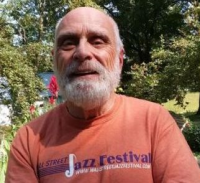 Daniel Brown has loved jazz (and music in general) ever since he delved into his parents’ 78 collection as a child. He is a retired special education teacher who began writing as a senior. He always appreciates being published in a journal or anthology. His first poetry collection, Family Portraits in Verse and Other Illustrated Poems, was recently published by Epigraph Books.
Daniel Brown has loved jazz (and music in general) ever since he delved into his parents’ 78 collection as a child. He is a retired special education teacher who began writing as a senior. He always appreciates being published in a journal or anthology. His first poetry collection, Family Portraits in Verse and Other Illustrated Poems, was recently published by Epigraph Books.
.
.
___
.
.
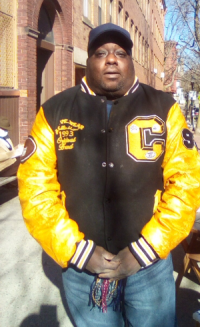
Erren Kelly is a three-time Pushcart nominated poet from Boston whose work has appeared in 300 publications (print and online), including Hiram Poetry Review, Mudfish, Poetry Magazine, Ceremony, Cacti Fur, Bitterzoet, Cactus Heart, Similar Peaks, Gloom Cupboard, and Poetry Salzburg.
Click here to read “Under Quarantine” — COVID-era poetry of Erren Kelly, published by Jerry Jazz Musician
.
.
___
.
.
photo by Kelly Sime
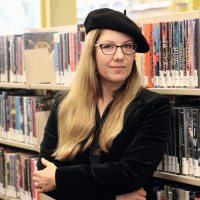
Lauren Loya is a tough-talkin’ dame roaming the streets of Kansas City. She is a graduate of the Literature, Language, and Writing program at the University of Kansas. Her poetry has appeared in Coal City Review and Kansas City Voices. She pays the bills working in magazine production, and any free time is spent haunting local bookstores, hiking trails, antique malls, and jazz clubs.
.
.
___
.
.
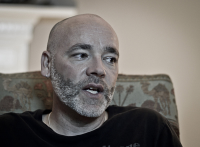
Sean Murphy has appeared on NPR’s “All Things Considered” as well as in USA Today, The New York Times, The Huffington Post, and AdAge. A long-time columnist for PopMatters, his work has also appeared in Salon, The Village Voice, Washington City Paper, The Good Men Project, Memoir Magazine, and others. He has twice been nominated for the Pushcart Prize, and his chapbook, The Blackened Blues, is now available from Finishing Line Press. To learn more, visit seanmurphy.net
.
.
___
.
.
.
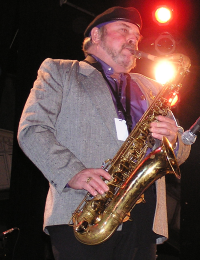
T.W. Parrish was formally educated in music performance. He writes original songs and performs equally well on trumpet, tenor sax, flute, and vocals. He’s performed in 47 states and abroad with some of the biggest names in entertainment. Originally from Fla., lived 16 years in Seattle, now retired in Lake of Ozarks, Missouri, playing occasionally in Kansas City. He has also written four books with painted illustrations. His favorite bands are Tower of Power and Poncho Sanchez, and his favorite music is Latin Jazz and Be Bop.
.
.
___
.
.
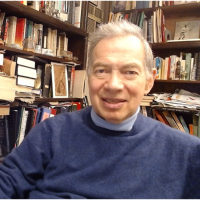 Peter Gregg Slater, a historian, has taught at several institutions, including Dartmouth College and the University of California, Berkeley. His poetry, fiction, parody, and essays have appeared in DASH, Workers Write!, The Satirist, Masque & Spectacle, and The Westchester Review. He has been a jazz buff since his teenage years, with a special passion for hard bop.
Peter Gregg Slater, a historian, has taught at several institutions, including Dartmouth College and the University of California, Berkeley. His poetry, fiction, parody, and essays have appeared in DASH, Workers Write!, The Satirist, Masque & Spectacle, and The Westchester Review. He has been a jazz buff since his teenage years, with a special passion for hard bop.
.
.
___
.
.
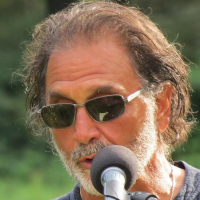
John L. Stanizzi has authored Ecstasy Among Ghosts, Sleepwalking, Dance Against the Wall, After the Bell, Hallelujah Time!, High Tide – Ebb Tide, Four Bits, Chants, Sundowning, and POND. Besides Jerry Jazz Musician, John’s poems have appeared in Prairie Schooner, Cortland Review, American Life in Poetry, and others. He’s been translated into Italian and appeared widely in Italy. He’s had nonfiction in Stone Coast Review, Ovunque Siamo, Literature and Belief, and others. John lives with his wife, Carol, in Connecticut.
.
.
.
___
.
.

Michael Steffen’s fifth collection of poems, In the Factory of Loathing, will be published by Fernwood Press in April, 2024. New work has recently appeared, or will appear soon, in Bollman Bridge Review, The Chaffin Journal and Literary Cocktail Magazine.
.
.
Listen to the 1947 recording of “Koko,” with Charlie Parker (alto saxophone); Dizzy Gillespie (trumpet); John Lewis (piano); Al McKibbon (bass); and Joe Harris (drums). [Universal Music Group]
.
___
.
.
Click here to read previous editions of The Sunday Poem
Click here for information about how to submit your poetry or short fiction
Click here to subscribe to the (free) Jerry Jazz Musician quarterly newsletter
Click here to help support the ongoing publication of Jerry Jazz Musician, and to keep it commercial-free (thank you!)
.
.
___
.
Jerry Jazz Musician…human produced (and AI-free) since 1999
.
.
.








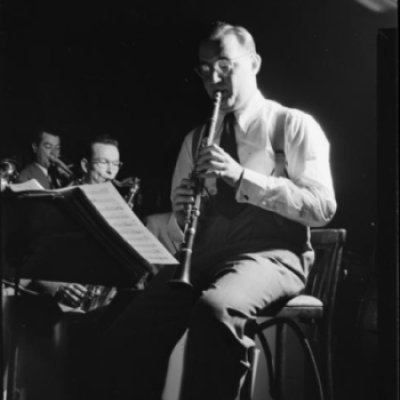


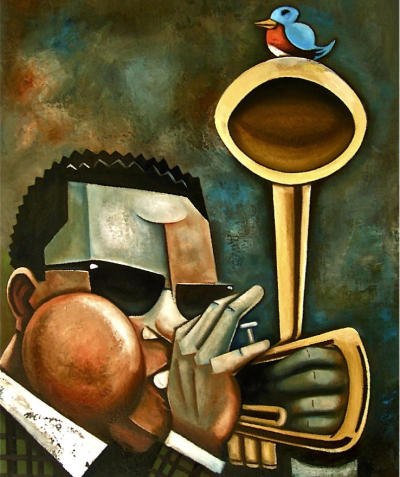



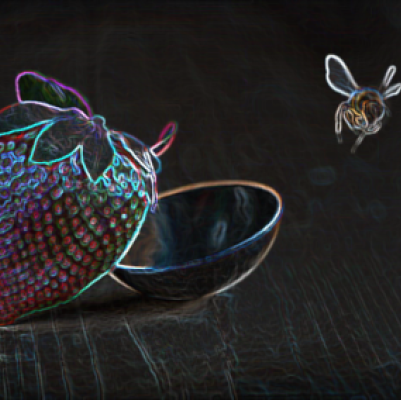





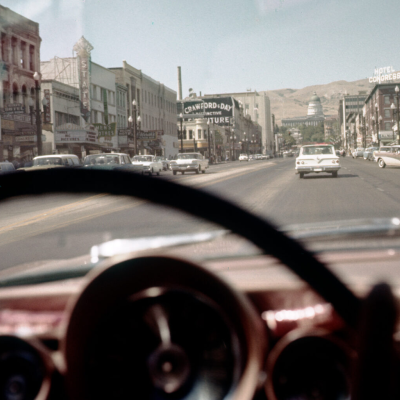
















A well-conceived grouping of poems that are all fascinating to read, both as poetry, and as insight into
Charlie Parker, and the times in which he lived (and died).
Oh my, those poems bring harder times back. Nice work.
Correction to Bio Note: Millicent Borges Accardi’s most recent book is Quarantine Highway (Flowersong Press 2022); the one before it was Through a Grainy Landscape (New Meridian 2019).
Only More So (Salmon) was published in 2016.
I really enjoyed Letter to Charlie Parker. Great spark of energy in the flow and a little history lesson too. Miss Loya is one to watch…